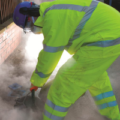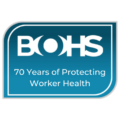BOHS calls on Prime Ministerial Candidates to end the national shame of asbestos deaths
The British Occupational Hygiene Society (BOHS), a leading scientific charity and the Chartered Society for Worker Health Protection, together with the Faculty of Asbestos Assessment and Management (FAAM), has called upon future Prime Ministerial candidates to commit to a proper national plan on asbestos. This follows HSE statistics released this month Asbestosis, mesothelioma,asbestos related lung cancer and non-malignant pleural disease in Great Britain 2022 (hse.gov.uk), showing an increase in asbestos deaths to over 5,000 each year.
The Society is critical of the Government’s “wishy-washy” response to Parliamentary Inquiry recommendations, published earlier this year. Parliament called on Whitehall to join up its thinking and collect better data to protect nurses, teachers and those in social housing who are at increasing risk of exposure to asbestos as building stock degrades.
“The Government response dodges the main issues coming out of the Inquiry. It needs to have a proper joined up strategy using research, tax incentives, communication, building control, the conveyancing system, technology, and the opportunities arising from the greening of buildings. Instead, the government plan is to use a handful of inspectors, a bit of social media and wishful thinking to move things on,” says Jonathan Grant, Registrar of the Faculty of Asbestos Assessment and Management.
“We are pleased that there are indications that the Government thinks it might be a good idea for people surveying for a cancer-causing toxin like asbestos, should now have some level of competence and accreditation. It’s also progress that they appreciate the need to ensure that the contractors who check to see that asbestos is being removed from properties properly, should not be on the same contractor’s payroll.”
Asbestos-related cancers cost the public purse hundreds of millions in health and social care costs and in benefits, as well as even more in compensation claims. Evidence presented to the Inquiry indicate that teachers and healthcare workers are at greater risk than most other workers of being exposed to harmful levels of asbestos.
The Society is particularly concerned about asbestos in the social housing stock. BOHS points out that the extent of asbestos in social housing, combined with the challenges of managing homes means that people living in Housing Association and Council accommodation could soon be adding to a new wave of asbestos diseases.
“HSE is the only game in town when it comes to enforcement and standards for asbestos. However, they do not deal with asbestos within social housing. If the new incumbent of number 10 is serious about levelling up, they need to be addressing asbestos, the poison in the attic of many ex-council houses,” says Professor Kevin Bampton, CEO of BOHS.
If the proposed policy of extending the right to buy further into social housing continues, the Society warns that there needs to be a more robust regime for ensuring that a house is not an asbestos time-bomb.
“In its Response, the Government says it is listening to professional bodies like us, but they clearly have not read the evidence given to Parliament, the Select Committee Report or its own statistics on asbestos deaths. The new PM needs to show leadership on asbestos, which is a national problem from the humblest of Council houses through to the Palace of Westminster itself.”






